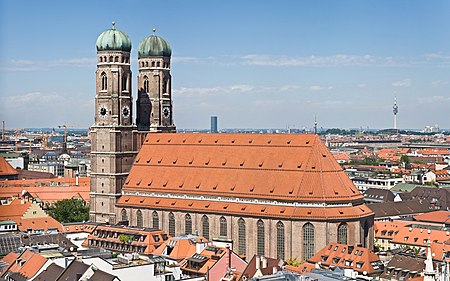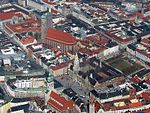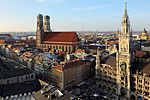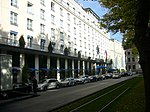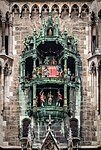Munich ( MEW-nik; German: München [ˈmʏnçn̩] (listen); Bavarian: Minga [ˈmɪŋ(ː)ɐ] (listen)) is the capital and most populous city of the German state of Bavaria. With a population of 1,558,395 inhabitants as of 31 July 2020, it is the third-largest city in Germany, after Berlin and Hamburg, and thus the largest which does not constitute its own state, as well as the 11th-largest city in the European Union. The city's metropolitan region is home to 6 million people. Straddling the banks of the River Isar (a tributary of the Danube) north of the Bavarian Alps, Munich is the seat of the Bavarian administrative region of Upper Bavaria, while being the most densely populated municipality in Germany (4,500 people per km2). Munich is the second-largest city in the Bavarian dialect area, after the Austrian capital of Vienna.
The city was first mentioned in 1158. Catholic Munich strongly resisted the Reformation and was a political point of divergence during the resulting Thirty Years' War, but remained physically untouched despite an occupation by the Protestant Swedes. Once Bavaria was established as a sovereign kingdom in 1806, Munich became a major European centre of arts, architecture, culture and science. In 1918, during the German Revolution, the ruling house of Wittelsbach, which had governed Bavaria since 1180, was forced to abdicate in Munich and a short-lived socialist republic was declared. In the 1920s, Munich became home to several political factions, among them the NSDAP. After the Nazis' rise to power, Munich was declared their "Capital of the Movement". The city was heavily bombed during World War II, but has restored most of its traditional cityscape. After the end of postwar American occupation in 1949, there was a great increase in population and economic power during the years of Wirtschaftswunder, or "economic miracle". The city hosted the 1972 Summer Olympics and was one of the host cities of the 1974 and 2006 FIFA World Cups.
Today, Munich is a global centre of art, science, technology, finance, publishing, culture, innovation, education, business, and tourism and enjoys a very high standard and quality of living, reaching first in Germany and third worldwide according to the 2018 Mercer survey, and being rated the world's most liveable city by the Monocle's Quality of Life Survey 2018. Munich is consistently ranked as one of the most expensive cities in Germany in terms of real estate prices and rental costs. According to the Globalization and World Rankings Research Institute, Munich is considered an alpha-world city, as of 2015. It is one of the most prosperous and fastest growing cities in Germany.
Munich's economy is based on high tech, automobiles, the service sector and creative industries, as well as IT, biotechnology, engineering and electronics among many other sectors. It has the strongest economy of any German city and the lowest unemployment rate of all cities in Germany with more than 1 million inhabitants. Munich is also one of the most attractive business locations in Germany. The city houses many multinational companies, such as BMW, Siemens, MAN, Allianz and MunichRE. In addition, Munich is home to two research universities, a multitude of scientific institutions, and world class technology and science museums like the Deutsches Museum and BMW Museum. Munich's numerous architectural and cultural attractions, sports events, exhibitions and its annual Oktoberfest, the world's largest Volksfest, attract considerable tourism. The city is home to more than 530,000 people of foreign background, making up 37.7% of its population.
